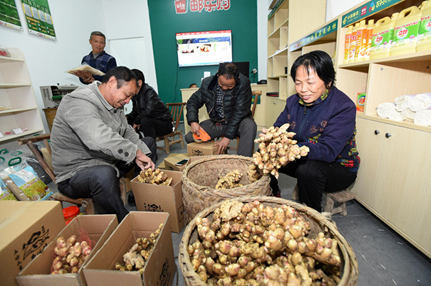Many impoverished areas in China have been trying to accelerate efforts to lift people out of poverty by using e-commerce to promote sales of their local special products.

Photo taken on Nov. 9, 2018 shows villagers pack fresh ginger and organic rice at an e-commerce service center in Tuling village, Hongtang township, Yichun city in southern China's Jiangxi province, to prepare goods for the upcoming Double 11 online shopping spree. (Photo: People's Daily Online)
Wei Yuanzhong, 44, is from Banjing village, Hezi town, Anyuan county, east China's Jiangxi province. He made more than 21 million yuan (about 3 million U.S. dollars) in sales on his online e-commerce cooperative last year, helping 55 poor households in the village increase their incomes. This would have been unimaginable just a few years ago.
Zou Wanming, head of an investment and development company in Dangxiong county, Lhasa city, southwest China's Tibet Autonomous Region, is also trying to promote sales of local yak products through e-commerce.
In August 2018, Dangxiong county held a "Yak E-commerce Festival" and invited teams from related industries across the country to Lhasa. After carrying out analysis and comparisons, Zou Wanming and the head of Dangxiong county selected an e-commerce team from Hangzhou in east China's Zhejiang province to take charge of product marketing.
"This way, we can make up for the shortage of local talents in e-commerce and let Dangxiong concentrate on doing a good job in yak farming and production," Zou Wanming said.
After the professional marketing team took over promotion for the product, it found that the outer packaging of yak products in Dangxiong was not suitable for e-commerce sales. The marketing team then hired professional designers to redesign the image and packaging of the products, replacing the original large packaging with small packages that are more suitable for family consumption, bringing them more in line with customers' consumption habits.
The increase in the added value of products and the maturity of the business model has raised the incomes of local farmers, and made e-commerce a more reliable option.


